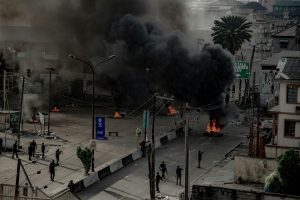US offered infrastructure incentive to achieve peace in eastern DRC
3 min readThe United States has extended an infrastructure incentive aimed at achieving peace in eastern Democratic Republic of Congo (DRC), offering to expand a key railway project to support the region’s development. This proposal is part of the US’s continued support for the Lobito Corridor, which connects the resource-rich yet landlocked DRC and Zambia to a port on Angola’s Atlantic coast.
Molly Phee, the outgoing assistant secretary of state for African affairs, revealed that the infrastructure initiative was proposed as part of efforts to encourage a peace agreement between the DRC and neighboring Rwanda. However, Phee noted that the Rwandan government, led by President Paul Kagame, appeared to have dismissed the offer, signaling a setback in diplomatic efforts. Kagame notably did not attend a summit in Luanda in December, coinciding with President Joe Biden’s visit to Angola, further complicating the diplomatic dynamics between the two nations.
The eastern DRC, particularly the provinces of North and South Kivu, has faced decades of armed conflict involving over 120 armed groups vying for control over land and valuable mineral resources. Among the most prominent of these groups are the M23 rebels, a militia believed to be backed by Rwanda. These rebels have taken control of vast areas in the region, contributing to the ongoing instability.
While Rwandan officials, including President Kagame, have consistently denied direct involvement in the conflict, accusations from both the DRC and the United Nations suggest that Rwanda plays a role in supporting the M23 insurgents. This involvement has exacerbated the humanitarian crisis in the region, with the United Nations estimating that nearly two million people have been displaced by the violence. The conflict has also fueled tensions between the DRC and Rwanda, which has been accused of interfering in the DRC’s internal affairs.
The situation in the eastern DRC is further complicated by the presence of numerous rebel groups with diverse motives. These include ethnic, political, and economic factors that contribute to the protracted instability in the region. The struggle for control over lucrative resources such as gold, tin, and coltan, essential for global technology production, has added an economic dimension to the conflict, drawing in external actors with vested interests.
The US-backed Lobito Corridor project, which aims to provide a vital transportation link from the DRC and Zambia to the Angolan coast, represents a potential solution to some of these challenges. By improving infrastructure and enhancing access to international trade routes, the project seeks to boost economic development in the DRC and its neighbors. However, the effectiveness of this initiative is closely tied to achieving lasting peace and stability in the eastern provinces, where violence and insecurity remain widespread.
Washington’s offer of extending the railway project as an incentive for peace highlights the United States’ broader diplomatic strategy in Africa, which includes fostering regional cooperation and addressing conflicts that have global repercussions. In the case of the DRC, the proposed infrastructure investment could play a key role in strengthening economic ties between Central and Southern Africa, while also providing an alternative to the violence and instability that has plagued the region for years.
Despite the challenges, the US and other international partners continue to press for a peaceful resolution to the conflict. Diplomatic efforts, including the Luanda summit, have sought to mediate the tensions between the DRC and Rwanda, although progress has been slow. The absence of Rwandan leadership at key diplomatic events, such as the December summit, underscores the difficulty of finding common ground and achieving a breakthrough in negotiations.
In conclusion, while the United States has made efforts to incentivize peace through infrastructure projects like the Lobito Corridor, the path to stability in the eastern DRC remains uncertain. The ongoing violence, coupled with the involvement of external actors like Rwanda, continues to undermine peace efforts. For any lasting resolution to be achieved, it will require a concerted effort from all parties, including the DRC, Rwanda, and international stakeholders, to address the root causes of the conflict and build a foundation for long-term peace and prosperity in the region.





